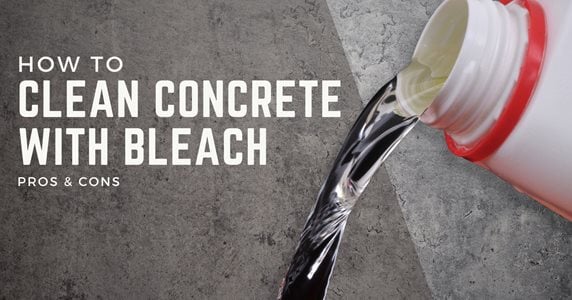- Concrete Cleaning Home
- Choosing a Concrete Cleaner or Degreaser
- How to Clean Exterior Concrete
- Concrete Cleaning Chemicals
- Pressure Washing Concrete
- Cleaning and Sealing Exterior Concrete: A Guide to Maintaining and Caring for Exterior Decorative Concrete of all Types
- Tips for Maintaining Exterior Concrete
- How to Clean Concrete
- How to Clean Concrete Floors
- How to Clean a Concrete Patio
- Cleaning a Concrete Driveway
- Cleaning Stamped Concrete
- Pool Deck Cleaning
- How to Clean Concrete Countertops
- How to Remove Stubborn Stains and Discoloration
- Advice on Cleaning Concrete Countertops, from Concrete-Countertops.org
- Related Information:
- Concrete Sealers
Cleaning Concrete with Bleach: Pros & Cons
Bleach can be an amazingly effective concrete surface cleaner, if you use it wiselyChlorine bleach has been a staple in household cleaning for more than a century, and is used for everything from sanitizing kitchen surfaces to removing mold and mildew in the bathroom. But did you know you can also use bleach to clean most decorative concrete surfaces, including driveways, patios, and countertops? Not only is bleach a bargain when compared to other cleaning products, it also works like magic to remove many common concrete stains.
However, like most cleaners, using bleach on concrete has its pros and cons. Here’s what to consider before using bleach for a specific concrete cleaning application.
PROS OF USING BLEACH
Bleach will not damage concrete when applied, yet it’s a highly effective cleaning agent.
A simple bleach and water solution and a little elbow grease are all you need to remove stubborn spot stains, mildew, and moss from most concrete surfaces.
You can also use bleach as a disinfectant to sanitize concrete countertops and to restore whiteness to plain, uncolored concrete.
Although chlorine bleach is a chemical, it is generally safe to use for most cleaning applications, as long as you dilute the bleach with water according to label directions.
Properly diluting bleach makes it more economical, since a little goes a long way.
CONS OF USING BLEACH
While bleach will not harm concrete, it might eat away at a concrete sealer or coating, especially if the bleach solution is not rinsed off well after application.
Bleach is highly corrosive and can be a serious environmental and health hazard when used incorrectly (see Precautions to Take When Using Bleach).
While bleach is great at disinfecting and mildew removal, it’s not the best choice for all concrete cleaning applications.
Bleach can emit harmful VOCs when used indoors.
WHAT CONCRETE SURFACES CAN I CLEAN WITH BLEACH?
Many types of concrete surfaces can be cleaned using bleach, including:
- Concrete driveways
- Concrete patios and pool decks
- Concrete countertops
- Concrete basement floors (prone to mold and mildew)
- Concrete pavers
- Concrete garage floors
- Concrete water features
Avoid using bleach to clean polished concrete floors because it can dull the finish. Instead, use only neutral-ph cleaners on polished concrete (see Cleaning Polished Concrete Floors.) You also shouldn’t use bleach to clean painted concrete floors because it can be too harsh and cause the paint to flake away.
HOW DO I CLEAN CONCRETE WITH BLEACH?
For disinfecting and mold and mildew removal, follow these steps:
- Put on protective gear
- Mix about 1/3 cup of bleach into a gallon of clean water in a plastic bucket or container
- Apply the bleach solution using a nylon-bristled brush or broom
- Scrub thoroughly
- Leave the bleach solution on the concrete for about 10 minutes
- Rinse it off by spraying with a garden hose
For spot removal of stubborn stains, such as food stains on concrete countertops, soak a cotton ball or rag with diluted bleach, place it on the stain and let it sit for 5 to 10 minutes, or until the stain has faded. Then rinse the area with water. (See How to Remove Stains from Concrete Countertops.)
You can also use bleach to get rid of moss in between the joints of concrete pavers, using a solution of one part bleach to 10 parts water. Mix the materials in a bucket and then pour over the affected areas. Scrub with a stiff-bristled broom, and then rinse the entire area with water.
Tip: For cleaning exterior concrete, look for bleach products formulated for outdoor use, such as Clorox® ProResults Outdoor Bleach. These concentrated formulas are thicker than standard bleach, so less is required to remove tough outdoor stains.
ARE THERE ALTERNATIVES TO BLEACH FOR CLEANING CONCRETE?
There are a number of environmentally-friendly alternatives to chlorine bleach for removing mold and mildew on concrete, including sodium percarbonate (also called oxygen bleach) and distilled white vinegar (see How to Clean Mold from Concrete). For outdoor concrete surfaces, such as driveways, patios, sidewalks, and pool decks, pressure washing is also an effective method for blasting away stains and mildew growth.
While bleach is great at disinfecting and mildew removal, it’s not the best choice for all concrete cleaning applications. It won’t, for example, eliminate pet urine odors on a concrete floor. And it’s not very effective at removing oil and grease stains on concrete. For these cleaning jobs, you’ll have better success using an enzymatic cleaner or a commercial concrete cleaner and degreaser. (See Choosing the Best Concrete Cleaner and Degreaser.)
 All-Purpose Concrete Cleaner
Removes sealers and coatings.
All-Purpose Concrete Cleaner
Removes sealers and coatings.
 Cleaner & Degreaser
Starting at $11.95
Cleaner & Degreaser
Starting at $11.95
 Brickform Neutra Clean
A pH neutral cleaner that combines cleaning and light degreasing
Brickform Neutra Clean
A pH neutral cleaner that combines cleaning and light degreasing
 Commercial Surface Cleaners
Cuts through grease and grime. Environmentally friendly
Commercial Surface Cleaners
Cuts through grease and grime. Environmentally friendly
 Kemiko Neutra Clean
Low VOC All Purpose Cleaner. Leed compliant.
Kemiko Neutra Clean
Low VOC All Purpose Cleaner. Leed compliant.
PRECAUTIONS TO TAKE WHEN USING BLEACH
Before cleaning any concrete surface with bleach, it’s important to read the warning label and safety data sheet for the product you’re using. The following precautions are particularly important.
- Never mix bleach with ammonia, vinegar, or other household cleaning products, since the combination can produce toxic fumes that are harmful to breathe.
- Because chlorine bleach is corrosive and can irritate or burn your skin and eyes, wear rubber gloves, protective clothing, and safety glasses to prevent accidental contact.
- Always work in a well-ventilated area. Bleach releases volatile organic compounds (VOCs) when used indoors, making it essential to open windows and doors.
- If you’re cleaning a patio or driveway, protect any nearby plants and landscaping by watering them before and after applying the bleach solution. When diluted as directed, bleach will not kill your plants or grass but it can cause leaf burn.
- To prevent bleach residue, make sure you rinse off surfaces as directed. This should be done before the bleach and water solution has a chance to dry.
- When purchasing chlorine bleach, make sure that the bleach concentration is for household use and not for industrial applications. Most liquid household bleach contains sodium hypochlorite (the active ingredient) at a concentration of 8.25%.
WHEN TO HIRE A PROFESSIONAL TO CLEAN YOUR CONCRETE
If your attempts at cleaning concrete with bleach are falling short, it might be time to hire a professional. Working with a concrete cleaning contractor has perks like knowledge and skill in cleaning concrete surfaces effectively. They'll use proper cleaning techniques, know the right products, and avoid potential damage to your concrete surfaces. Additionally, contractors can provide a more thorough and efficient cleaning service, saving you time and effort.






